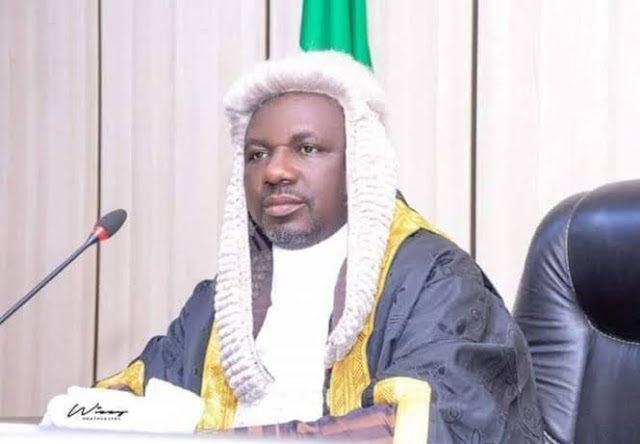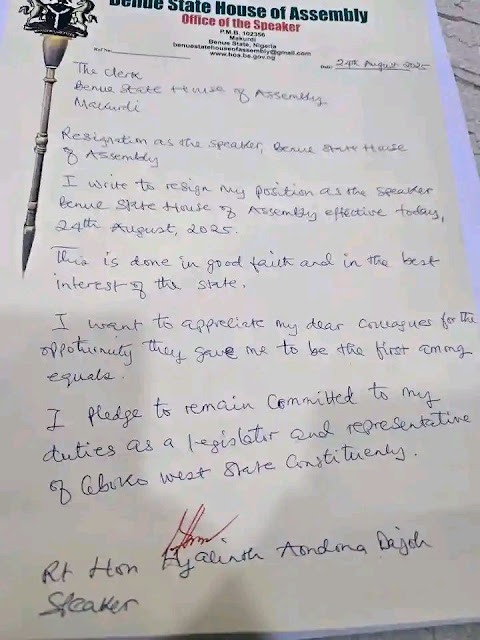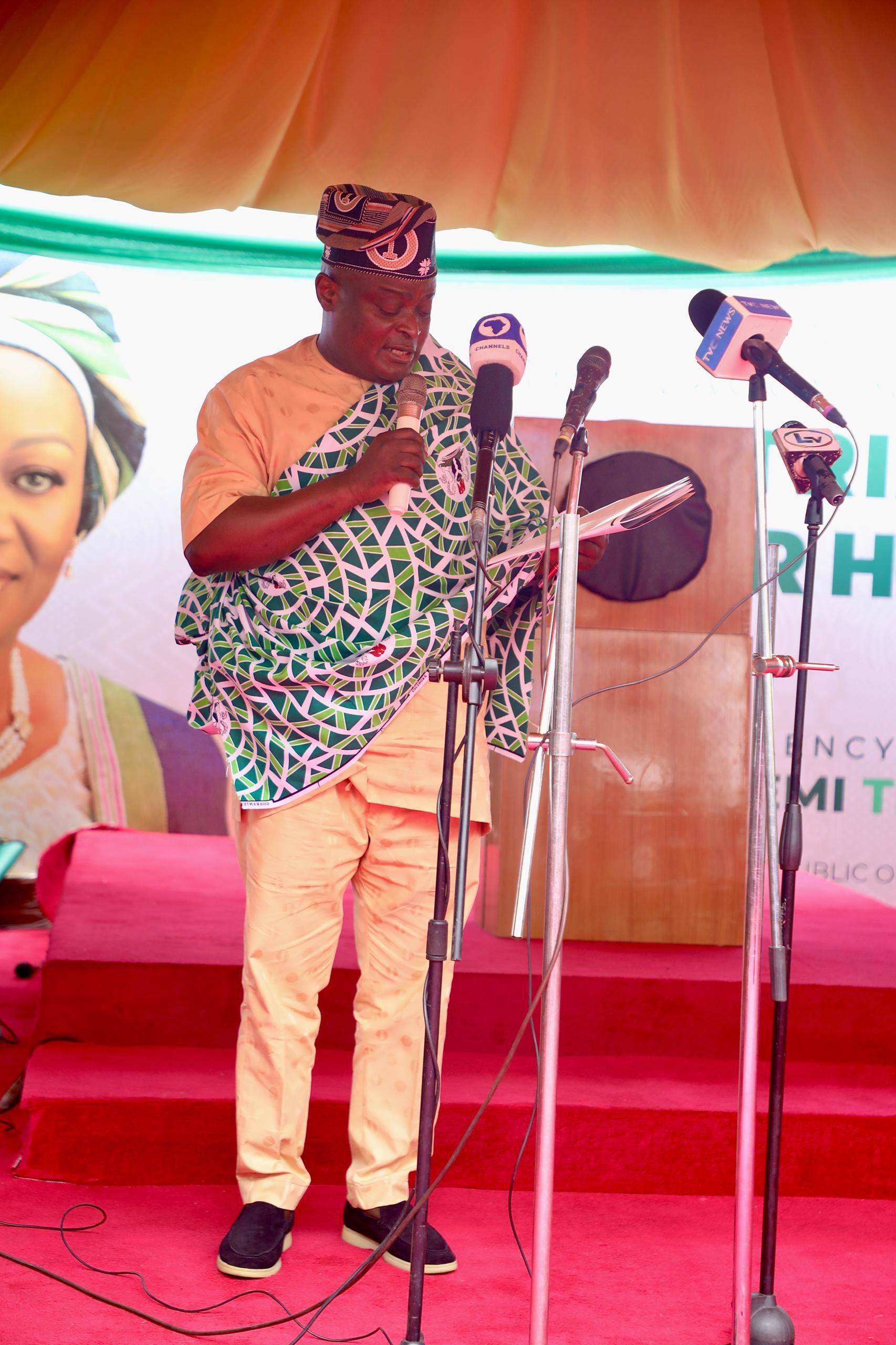In a significant development that has sent ripples through the political landscape of Benue State, Aondona Dajoh, the Speaker of the Benue State House of Assembly, tendered his resignation on Sunday, August 24, 2025. The announcement, contained in a letter personally signed by Dajoh and obtained by Channels Television, marks a pivotal moment in the state’s legislative affairs. The resignation comes on the heels of a turbulent period within the Assembly, characterized by the suspension of four lawmakers accused of plotting to impeach the Speaker. This article delves into the details of Dajoh’s resignation, the events leading up to it, the political dynamics at play, and the broader implications for governance in Benue State.
The Resignation Letter: A Gesture in Good Faith
In his resignation letter, Aondona Dajoh formally stepped down from his position as Speaker, citing that the decision was made “in good faith and in the best interest of the state.” The letter, concise yet poignant, expressed gratitude to his colleagues for the opportunity to serve as the “first among equals” in the Assembly. Dajoh, who represents Gboko West State Constituency, pledged to continue fulfilling his duties as a legislator, signaling that his resignation was specific to the speakership and not a withdrawal from public service altogether.
“I write to resign my position as the Speaker, Benue State House of Assembly, effective today, August 24, 2025,” the letter read in part. “I want to appreciate my dear colleagues for the opportunity they gave me to be the first among equals. I pledge to remain committed to my duties as a legislator and representative of Gboko West State Constituency.”
While the letter did not explicitly outline the reasons behind his decision, the timing and context suggest that recent developments within the Assembly, particularly the alleged impeachment plot and the subsequent suspension of four lawmakers, may have played a significant role. Dajoh’s reference to acting in the “best interest of the state” indicates a desire to de-escalate tensions and restore stability to the legislative body, which has been embroiled in controversy.
The Backdrop: Suspension of Four Lawmakers
The resignation follows a dramatic turn of events within the Benue State House of Assembly, where four lawmakers—Alfred Berger (Makurdi North), Terna Shimawua (Kian), Cyril Ekong (Obi), and James Umoru (Apa)—were suspended for six months. The suspension, which occurred just days before Dajoh’s resignation, was based on allegations that the quartet was involved in a plot to impeach the Speaker. The decision to suspend the lawmakers was initiated through a motion of urgent importance moved by the Majority Leader, Saater Tiseer, who argued that the action was necessary to avert a “needless crisis” within the legislature.
The suspension of the lawmakers sparked widespread debate, with some viewing it as a defensive maneuver to protect Dajoh’s leadership, while others criticized it as an attempt to suppress dissent within the Assembly. The move highlighted deep-seated divisions among the lawmakers, raising questions about the stability and cohesion of the legislative body. The fact that the suspensions were linked to an alleged impeachment plot further fueled speculation about internal power struggles and external influences shaping the Assembly’s dynamics.
Governor Alia’s Stance: Upholding the Rule of Law
Amid the unfolding drama, Governor Hyacinth Alia, the executive head of Benue State, sought to distance himself from the alleged impeachment plot. In a public statement, Alia emphasized his commitment to the rule of law and the principle of separation of powers, asserting that he had no involvement in the efforts to remove Dajoh as Speaker. This clarification was significant, as it aimed to dispel rumors of executive interference in the legislative crisis, a recurring issue in Nigerian politics where governors are often accused of meddling in the affairs of state assemblies.
Alia’s statement underscored the delicate balance of power between the executive and legislative arms of government in Benue State. By publicly disassociating himself from the impeachment plot, the governor sought to maintain a neutral stance, allowing the Assembly to resolve its internal conflicts without the perception of external manipulation. However, the governor’s remarks did little to quell speculation about the underlying factors driving the tensions within the Assembly, including the role of political factions and vested interests.
The Political Context: Benue’s Complex Dynamics
To fully understand the significance of Dajoh’s resignation, it is essential to examine the broader political context in Benue State. Benue, often referred to as the “Food Basket of the Nation” due to its agricultural productivity, has a complex political landscape shaped by ethnic diversity, economic challenges, and security concerns. The state is home to various ethnic groups, including the Tiv, Idoma, and Igede, each with significant political influence. These ethnic dynamics often play a role in the distribution of political offices, including the speakership of the state assembly.
Aondona Dajoh, a Tiv from Gboko West, assumed the speakership at a time when Benue was grappling with multiple challenges, including recurrent clashes between farmers and herders, economic stagnation, and the need for legislative reforms to address these issues. As Speaker, Dajoh was tasked with leading a diverse group of lawmakers in navigating these challenges while maintaining unity within the Assembly. His tenure, however, was marked by tensions, as evidenced by the recent impeachment plot and the subsequent suspensions.
The alleged plot to impeach Dajoh may have been driven by a combination of factors, including disagreements over legislative priorities, personal ambitions, and external pressures. In Nigerian state politics, the position of Speaker is highly coveted, as it comes with significant influence over legislative processes, budget approvals, and political appointments. As such, competition for the speakership can lead to intense rivalries, with lawmakers forming alliances and counter-alliances to secure or maintain power.
Implications of the Resignation
Dajoh’s resignation has far-reaching implications for the Benue State House of Assembly and the state’s political landscape as a whole. Below are some of the key implications:
Leadership Vacuum and Succession: The immediate consequence of Dajoh’s resignation is the creation of a leadership vacuum in the Assembly. The speakership is a critical position that sets the tone for legislative activities, and the process of selecting a new Speaker is likely to be contentious. Lawmakers will need to navigate ethnic, political, and personal considerations to elect a successor who can command the respect and support of the majority. The outcome of this process will shape the direction of the Assembly in the coming months.
Restoration of Stability: By stepping down, Dajoh may have sought to diffuse the tensions that arose from the impeachment plot and the suspension of the four lawmakers. His resignation could pave the way for reconciliation among the lawmakers, allowing the Assembly to refocus on its legislative duties. However, the success of this effort will depend on the ability of the new leadership to foster unity and address the grievances of all factions.
Impact on Legislative Agenda: The Benue State House of Assembly plays a crucial role in addressing pressing issues such as security, agriculture, and infrastructure development. The recent turmoil and Dajoh’s resignation could disrupt the legislative agenda, delaying the passage of critical bills and policies. The new Speaker will need to prioritize restoring confidence in the Assembly’s ability to deliver on its mandate.
Public Perception and Trust: The events surrounding Dajoh’s resignation, including the suspensions and allegations of an impeachment plot, have likely eroded public trust in the Assembly. Citizens may view the legislature as a battleground for personal and political interests rather than a body committed to serving the people. Rebuilding public confidence will require transparent leadership and a commitment to addressing the state’s challenges.
Governor-Legislature Relations: While Governor Alia distanced himself from the impeachment plot, the resignation could influence the relationship between the executive and legislative arms. A new Speaker may seek to assert greater independence or align more closely with the governor’s agenda, depending on the political dynamics at play. This relationship will be critical in determining the state’s governance trajectory.
The Road Ahead: Challenges and Opportunities
As Benue State moves forward following Dajoh’s resignation, several challenges and opportunities lie ahead. The Assembly must address the immediate task of selecting a new Speaker, a process that will test its ability to unite and move beyond recent divisions. The new leadership will also need to address the underlying issues that led to the impeachment plot, including allegations of mismanagement, favoritism, or external interference.
On the opportunity front, Dajoh’s resignation offers a chance for the Assembly to reset and refocus on its core responsibilities. By fostering a more inclusive and collaborative environment, the legislature can regain public trust and tackle pressing issues such as insecurity, economic development, and social welfare. The new Speaker will play a pivotal role in shaping this agenda, balancing the interests of lawmakers, constituents, and the state government.
Furthermore, the resignation underscores the need for reforms within the Assembly to prevent similar crises in the future. Strengthening internal mechanisms for resolving disputes, ensuring transparency in legislative processes, and promoting accountability could help stabilize the institution and enhance its effectiveness.
Broader Implications for Nigerian Politics
The events in Benue State are not isolated but reflect broader trends in Nigerian state politics, where power struggles, ethnic considerations, and executive-legislative tensions are common. The resignation of a Speaker in a state assembly often signals deeper issues within the political system, including the struggle for control over resources, influence, and political relevance. As such, the situation in Benue could serve as a case study for other states grappling with similar challenges.
Moreover, the role of the media in reporting these developments cannot be overstated. Channels Television’s coverage of Dajoh’s resignation letter and the preceding events highlights the importance of a free press in holding public officials accountable and informing citizens about political developments. The media’s role in shaping public discourse will be critical as Benue navigates this transition.
The resignation of Aondona Dajoh as Speaker of the Benue State House of Assembly on August 24, 2025, marks a significant moment in the state’s political history. Driven by a combination of internal divisions, an alleged impeachment plot, and a desire to act in the best interest of the state, Dajoh’s decision has set the stage for a new chapter in Benue’s legislative affairs. While challenges remain, including the need to select a new Speaker and restore stability, the resignation also presents an opportunity for the Assembly to address its shortcomings and refocus on serving the people of Benue State.
As the state moves forward, the actions of its lawmakers, the new Speaker, and Governor Hyacinth Alia will be closely watched. Their ability to navigate the complex political landscape, address pressing issues, and rebuild public trust will determine the legacy of this turbulent period. For now, Dajoh’s resignation serves as a reminder of the fragility of political institutions and the importance of leadership that prioritizes the collective good over personal or factional interests.







